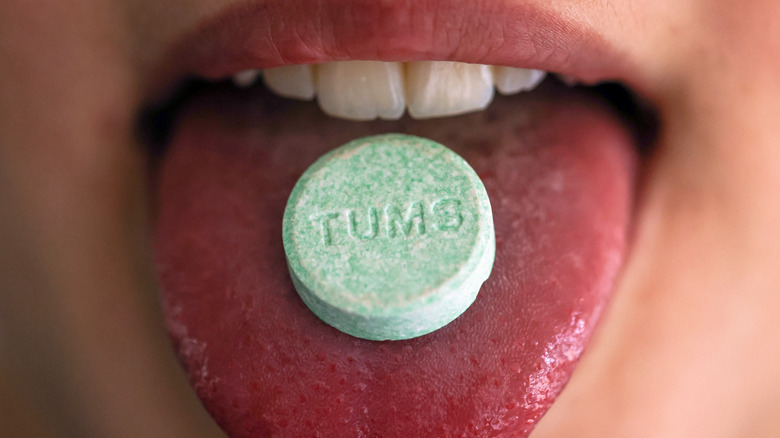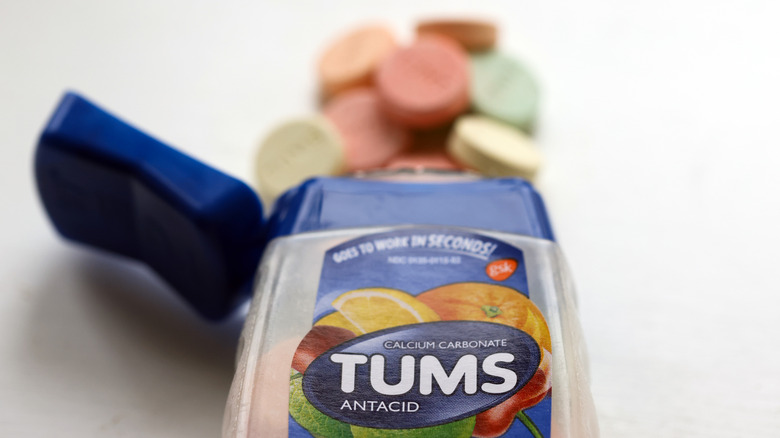When You Take Tums Every Day, This Is What Happens
We all eat something that doesn't agree with us every now and again. And when that happens, Tums can come to the rescue. A popular antacid, Tums is an effective and easily obtainable medication for symptoms of heartburn or an unsettled belly, according to WebMD. Working by neutralizing excess stomach acid, this oral medication has become a go-to for many Americans who experience gastrointestinal issues, be that regularly or on a one-off basis. (And it helps that they don't taste too bad, too.)
But as Tums is a medication that works quickly and successfully in most cases, it's all too easy to start reaching for your pill bottle whenever you're feeling the first sign of stomach upset. But is that the right thing to do? And what's the impact on your body when you're taking Tums regularly? Join us as we take a look at all things Tums, and what happens if you decide to take them every day.
If you take Tums every day, you might experience constipation
While Tums may work wonders on your stomach, taking them every day might have a less-than-ideal effect on your bowel movements. Tums and other antacids contain active ingredients that work to neutralize stomach acid, and Tums use calcium to help reduce stomach upsets, says Harvard Health Publishing. Unfortunately, this may end up causing constipation, which in turn means that you may end up experiencing an entirely different kind of belly pain.
Remember that Tums aren't the only antacids that contain calcium: Caltrate and Rolaids are also calcium-based medications that may result in difficulty passing stools. Aluminum-based antacids, or combined aluminum and calcium-based antacids like Gaviscon, can also see you experiencing issues on the toilet with constipation, whereas magnesium-based antacids like Mylanta and Maalox may promote, conversely, diarrhea. We know, it's a minefield out there! The best thing to do, however, is to keep track of your bowel's reaction to taking Tums. If you're taking it daily and you notice a significant change in your movements, pause and consult a doctor.
Taking Tums every day might increase your chance of kidney stones
If you ever have kidney stones, you'll likely know pretty fast. While some kidney stones can pass undetected, these hard deposits, formed by collections of waste material passing through your kidneys, can often be incredibly painful, particularly when passed through urinating (per the National Kidney Foundation). And if you're in the habit of taking Tums every day, you may increase your chances of developing kidney stones, according to WebMD. Tums can boost your calcium levels, contributing to the build-up of kidney stones in your organs (and leaving you with a painful trip to the toilet).
Luckily, most kidney stones will pass without the need for significant treatment or leaving permanent damage to the body, says the Mayo Clinic – so if you have them, there's usually no need for concern. Despite this, it's important to keep an eye on your medication intake as well as your diet to reduce the likelihood of developing them. In addition to minimizing the intake of calcium-containing medications like Tums, it's also a good idea to cut back on foods containing oxalates, like spinach, almonds, soy products, and potatoes (per WebMD). If your kidney stones are accompanied by significant pain or other symptoms like blood in your urine or difficulty when going to the toilet, consult a trained medical professional.
Having Tums daily can impact your muscles
The medication that we take can affect far more than just the body part or ailment that it's targeting. And in the case of Tums, they may have a knock-on effect on other areas, especially if you're taking them every day. "Muscle twitching, generalized weakness, and even muscle tenderness and pain are the most common complaints" when taking Tums or other antacids with too much frequency, explains Lenox Hill Hospital attending emergency physician and Northwell Health assistant professor of emergency medicine Robert Glatter to Prevention.
The reason for this, Glatter explains, is because the active ingredients in these antacids, like calcium in the case of Tums, alter the levels in your blood. This can then introduce an electrolyte imbalance into your system, and your muscles react accordingly. As Glatter says, "the severity of the symptoms is influenced by the amount of antacids and duration of use." In simpler terms, the more Tums you take, the more likely you are to experience effects on your muscles.
When you use Tums every day, you might just be masking your symptoms
One of the main selling points of Tums is, quite simple, how effective they are: If you have heartburn, they work fast, and they get the job done. But is this really the best thing for you?
A large problem with using Tums every day is that while they may reduce the effects of gastroesophageal symptoms like heartburn, indigestion acid reflux, or GERD, this is symptomatic treatment and doesn't necessarily address the causes of these effects, writes NYU School of Medicine assistant professor of medicine Roshini Rajapaksa for Health. And what's causing these symptoms may need to be addressed far more urgently to stop your heartburn in its tracks, instead of masking it with antacid medication. Health conditions like gallstones or peptic ulcers may be contributing to your unsettled stomach or indigestion, and by taking Tums, you're not treating them directly.
Rajapaksa also points out that by failing to address the underlying causes of heartburn, you may end up with a larger problem on your hands later on, due to the repeated effects of excess stomach acid on your system.
Taking Tums daily will help reduce symptoms of heartburn
Well, this may be comforting to know, we guess. But while we're loathe to state the totally obvious, it's true: Taking Tums every day is an effective way to bring down symptoms of heartburn. We can imagine the marketing team over at Tums HQ will be pleased to hear us say that!
So how exactly do they do that? It all lies in the stomach acid, folks. When our stomach acid can work its way through the protective lining in our stomachs or move up into our esophagus, it can cause ulcers or heartburn, respectively, says Patient. What antacids like Tums do is introduce an alkali ingredient (like calcium or other minerals) to our stomach acid and, in doing so, neutralize it. In turn, this reduces the severity of any symptoms caused by the acid, like that annoying burning feeling in your chest. Pretty cool, right?
One thing to note, though, is that as the antacid effects wear off, your symptoms may return. Medications like Tums generally offer temporary relief, and recurrent instances of heartburn or gastric upset should be examined by a doctor.
Taking Tums every day might interact with other meds you're taking
While Tums and other antacid medications are widely available over the counter, that doesn't mean you should take them without any consideration of other factors.
If you're taking Tums daily, it's important to be aware of any interactions with drugs you might already be taking. This can often be down to the calcium levels in Tums, which may inhibit or change the effects of other medications, WebMD states. Certain antibiotics, for example, may be rendered less effective by the calcium carbonate from Tums, reducing their impact. One example is doxycycline, a common antibiotic used to treat conditions as wide-ranging as acne and malaria (per WebMD).
Other medications like estramustine (which is used to treat prostate cancer) may also be impacted by the persistent presence of calcium carbonate provided via Tums. Before taking Tums, it's vital to check the labels of any medications you might already be taking. On the flip side, if you're starting a new treatment of medicine, make sure you ask your pharmacist or doctor about potential interactions.
If you take Tums daily, you might have a change in your breathing
When we take Tums, we expect our aching bellies to be addressed, and little else. But one pretty dramatic side effect of taking Tums every day could occur to your breathing, thanks to the introduction of alkaline elements to your system through the antacid's calcium carbonate. "As the pH in the bloodstream rises, the body compensates for the more alkaline environment, thus reducing the respiratory or breathing rate," explains assistant professor of emergency medicine Robert Glatter to Prevention.
In addition to being fairly unsettling to have your breathing slow down noticeably, this may also cause knock-on health effects. "When breathing slows excessively, it could lead to a buildup of carbon dioxide, leading to fatigue or sleepiness," Glatter explains. Slower breathing may not only occur with calcium-based antacids, too. Glatter states that antacids containing sodium carbonate can also instigate a breathing change. Needless to say, if your Tums intake is provoking a slowing down in your respiratory frequency, it may be wise to reduce your dosage.
Having Tums every day might affect your teeth
Like other antacids, Tums are taken orally, by chomping down on the chalky tablets and waiting for that sweet, sweet heartburn relief. But the oral channel by which this medication is taken means that it's passing other body parts on its way to your stomach, and it may impact them along the way. One such body part is your teeth.
A big reason why Tums are so easy to take (and tasty) is that they contain a significant amount of sugar. After chewing them down, leftover sugary residue can end up stuck in the nooks and crannies of your teeth and gums, explains dentist Dr. Ian Bell. This may result in increased development of cavities, made even worse by the fact that regular antacid use can dry out your mouth, reducing the ability of your saliva to wash the sugary deposits away.
There's also the bounce-back effect of your stomach acid to consider. As your body adapts to you taking Tums, it may end up producing additional stomach acid to counteract the effects of the antacid. This increased acidity may end up impacting your teeth, weakening them over time, particularly if your symptoms include heartburn and acid reflux. If you're concerned about the effects your Tums intake could be having on your dental health, make sure you discuss the matter with your dentist.
If you have GERD, taking Tums daily might help your blood pressure
It can be difficult to discern the difference between gastroesophageal conditions. After all, heartburn's heartburn, right? Well, not quite, as anyone who experiences gastroesophageal reflux disease (or GERD) will tell you. Characterized by the repeated movement of stomach acid into your esophagus, GERD can irritate and cause damage to the lining of this passage over time, and may even have knock-on effects and other symptoms, explain the Mayo Clinic.
But interestingly, if you're taking Tums to counteract symptoms of GERD, you may be benefitting from an unintentional effect on your blood pressure. Research published in the Journal of Clinical Gastroenterology examined the link between GERD and blood pressure, and established that there's a clear link between experiencing the condition and having higher blood pressure overall. However, the researchers also found that taking antacids may help to keep blood pressure at a normal level. It's worth pointing out that GERD is often treated using prescribed proton pump inhibitor (or PPI) medication, which works differently from Tums, by reducing the overall amount of stomach acid produced by the body, as opposed to neutralizing the acid already present (per MedlinePlus). Proton pump inhibitors should only be taken on the advice of a healthcare professional.
Taking Tums every day might cause hypercalcemia
We're taught, pretty much since day one, that the more calcium we get, the better. After all, it helps us build healthy bones and teeth, so if we're taking Tums (which are calcium-based), then surely that's just more good old-fashioned calcium for our bodies, right? Well ... not quite. And in fact, taking Tums daily may result in us having way too much calcium — a condition known as hypercalcemia, which has a range of unpleasant effects (per the Cleveland Clinic).
Hypercalcemia is a relatively commonplace occurrence, and can be caused by a range of medical conditions, as well as simply being hydrated. Although the average blood test can usually find hypercalcemia and assist in initiating treatment, it may lead to a range of health consequences if left unchecked. Interestingly, this includes increased incidences of broken bones and lower bone strength overall.
Hypercalcemia may not reveal itself through symptoms, so it's possible to have it and not know. However, you may experience nausea, vomiting, a higher frequency of urination, aching muscles, or tiredness as a result. The best way to tell for sure, though, is with a blood test.
Taking Tums daily can increase your risk of infection
Taking Tums may be an effective way to cut back on heartburn, but it could also impact your health more generally. And the alterations that occur in the stomach when you take Tums with regularity might end up having an impact on your susceptibility to other illnesses.
"While gastric acid helps to digest food, it also protects the body by destroying bacteria that are contained within food and beverages," explains assistant professor of emergency medicine Robert Glatter to Prevention. But when you're constantly neutralizing your stomach acid, it means that more bacteria can survive. Thus, your natural immunity may be compromised, leaving these unpleasant bugs to take hold.
A lot of the bugs that may end up more able to infect you are bacteria that affect your stomach, causing diarrhea and gastroenteritis, Glatter says. Ironically, by trying to cure one stomach ailment, you could be unintentionally causing another. Glatter states that using Tums too often could also increase your risk of contracting respiratory infections, like colds or the flu.
Having Tums every day could impact your heart health
Tums are a largely safe product to use in moderation, and can provide much-needed relief from gastric issues. But when you start to take it in larger quantities, things can go awry for other parts of your body.
Taking Tums or other calcium-containing antacids regularly can lead to acute hypercalcemia, according to research published in SAGE Open Medical Case Reports. And when hypercalcemia becomes severe, it can start to impact your organs, adding not only strain to your kidneys and changing your brain function, but also potentially causing your heart to function irregularly, with palpitations and arrhythmia manifesting as symptoms.
In fact, the impact of excess calcium on heart health is very real and very important to know. As research published in the BMJ shows, a heavy intake of calcium (examined here through the impact of calcium supplements) appears to result in an increased risk of developing cardiovascular disease, as well as a higher chance of myocardial infarction or stroke. It's important to regularly take stock of your calcium intake across the board, not just from your diet — medications like Tums and supplements can sneakily increase your levels by a fair amount.
How often should you take Tums?
Given that they're so easy to find and so easy to take, it's tempting to pop Tums like candy (which isn't helped by the fact that they're also, quite frankly, really tasty). But as it's all too convenient to take a Tums whenever you're feeling an upset stomach, we can lose track of how often we should actually be consuming them.
Luckily, Tums had the answer for us: Depending on the product you opt for, you should be taking between one and four Tums tablets upon the occurrence of your symptoms. Bear in mind the strength of the tablets that you're taking when you're planning your dose. For Tums Ultra Strength tablets, for example, you should take no more than three at a time, and for Chewy Bites with Gas Relief, 1-2 tablets are the recommended dosage. It's also advised not to take more than both your individual or daily dose of Tums, per your specific medicine's instructions.
But is that okay to take Tums indefinitely? Well ... not really. As the Tums website indicates, you shouldn't be taking the antacid for more than two weeks regularly if your symptoms are persisting, unless a doctor is telling you to do so. So, if you're self-prescribing Tums every day (or have been for some time), it's essential to talk to a healthcare professional to determine how safe this is — and perhaps more importantly, what the root cause of your digestive issues might be.














